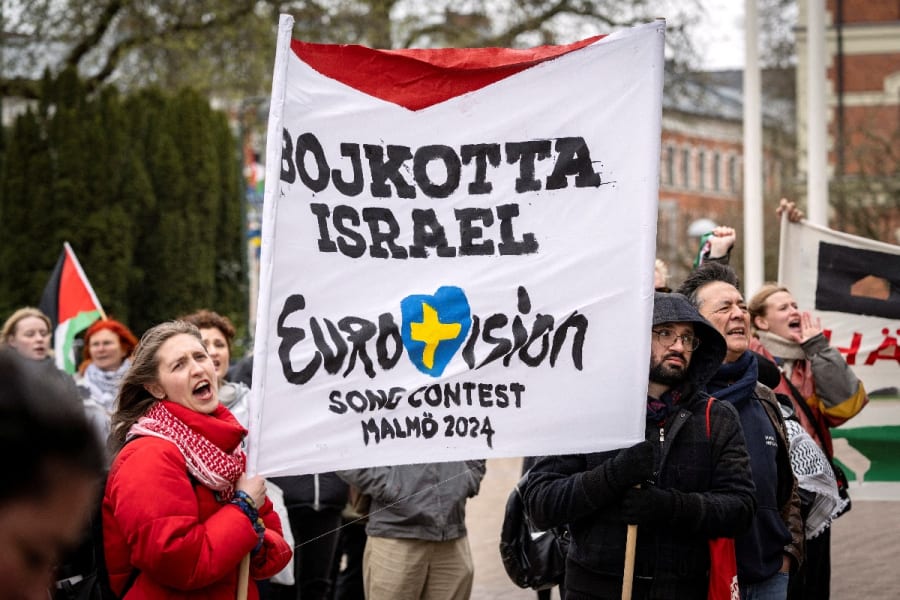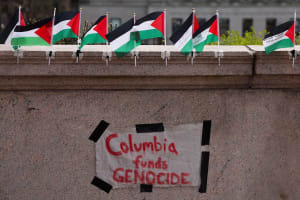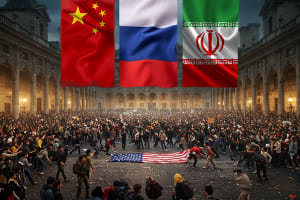Jews in Malmö, Sweden fear growing antisemitism, anti-Israel riots ahead of Eurovision
Weekly anti-Israel demonstrations have taken place in Malmö since Oct. 7

The Swedish coastal city of Malmö is drawing international attention as the host of the upcoming Eurovision Song Contest in May.
While normally a festive event, this year’s Eurovision has been clouded by growing antisemitism and anti-Israel sentiments amid the war between Israel and the Hamas terrorist organization.
With approximately 25% of Malmö’s population originating from Muslim-majority countries, the city’s small Jewish community is increasingly concerned about potential antisemitic violence and anti-Israel rioting.
“The antisemitic messages are everywhere now in Malmö, whether on posters or in the press,” said Yair Elsner, a local Israeli Jewish resident. “The anti-Israel propaganda is highly visible on the streets, anti-Israel stickers and decals are everywhere."
Elsner emphasized local Jews usually live fairly normal lives.
“No one throws stones through my window or eggs at me on the street, and this is despite me having a fairly high profile,” he admitted.
Elsner has become a public pro-Israel voice with his podcast and Twitter content.
“I run a podcast here that I launched after October 7 in which I convey clear pro-Israel messages, I write those messages on Twitter, and so far I haven’t received any threats to my life.”
There have allegedly been weekly anti-Israel demonstrations in Malmö since Oct. 7, was Hamas terrorists invaded southern Israel border communities, killing 1,200 and abducting more than 250 people.
"There is absolute demonization, and it's horrible," Elsner said. "None of us can walk on the street with Jewish symbols, except for the local rabbis. I won't hang an Israeli flag on my balcony on Independence Day because I'm sure it would only take a day before someone hits me with a stone thrown through my window."
"I'm sure that it's going to be worse in the days around Eurovision, and I assume warnings will be issued by the authorities," he added.
Aharon, another local Jewish resident, echoes similar sentiments. He laments the fact that Swedish authorities have been unable to manage the growing antisemitism among the large Muslim population in Malmö.
“Even before October 7, the atmosphere in Malmö was anti-Israel. But after October 7, it only increased, and now there are protests and demonstrations everywhere, and now there are protests and demonstrations everywhere, including demonstrations around places that sell Israeli products or are connected to Israelis,” he said.
"Within the Jewish community in Malmö, there is fear that there will be crazy riots during Eurovision and that a Jew is not safe walking around on the streets now,” Aharon added.
Malmö has historically been fairly homogenous, with well-integrated minorities. However, the city’s demographics changed dramatically in the 1990s and 2000s with a large influx of immigrants from the Middle East and North Africa.
Unlike earlier waves of immigration, many immigrants from the Middle East face challenges integrating into Swedish society, often living in socially isolated areas where Arabic is frequently spoken in the streets.
A local Jewish resident of Malmö, Yael Segas Wallstrom, explained that it has become a very segregated city.
“Malmö is divided into areas. There are very Muslim areas and it’s best not to wander into them, she said. “I try not to walk in very antisemitic areas that look like Ramallah.”
In early April, the Israeli Eurovision singer Eden Golan received death threats ahead of the upcoming song contest competition in Malmö.
“I took into account that I would also receive such comments on Instagram,” Golan said.
“I feel confident and determined to represent Israel in the best possible way. Our delegation travels with a trained security team, and I am sure they will do their best job to protect us,” she said.
In February, the European Broadcasting Union (EBU) considered disqualifying Israel from the Eurovision Song Contest, saying the lyrics to Israel's entry were too "political."
The following month, Israel presented a new song entry, “Hurricane,” which Golan will perform live next month.
Despite being located in the Middle East region, Israel has participated in Eurovision since the early 1970s and has won the contest four times: 1978, 1979, 1998 and 2018.

The All Israel News Staff is a team of journalists in Israel.
You might also like to read this:
















